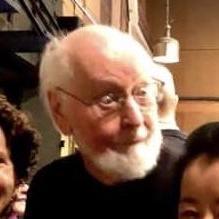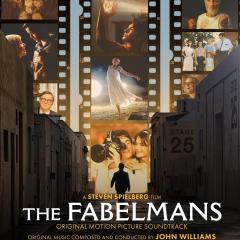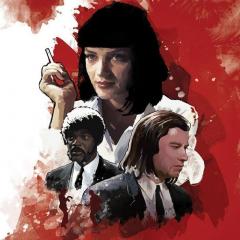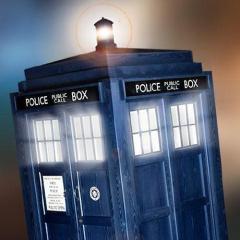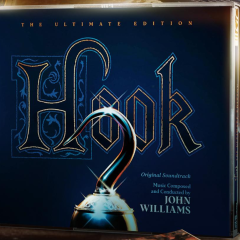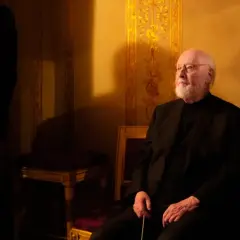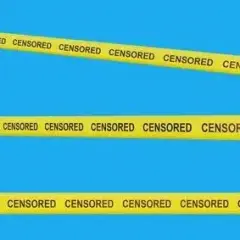-
Posts
1,069 -
Joined
-
Last visited
-
Days Won
13
Reputation Activity
-
 Ludwig reacted to Jay in NEW book by Frank Lehman - The Skywalker Symphonies: Musical Storytelling in Star Wars
Ludwig reacted to Jay in NEW book by Frank Lehman - The Skywalker Symphonies: Musical Storytelling in Star Wars
The happy news I cryptically alluded to last week is now something I can make official: I just signed a book contract with OUP for 𝘛𝘩𝘦 𝘚𝘬𝘺𝘸𝘢𝘭𝘬𝘦𝘳 𝘚𝘺𝘮𝘱𝘩𝘰𝘯𝘪𝘦𝘴: 𝘔𝘶𝘴𝘪𝘤𝘢𝘭 𝘚𝘵𝘰𝘳𝘺𝘵𝘦𝘭𝘭𝘪𝘯𝘨 𝘪𝘯 𝘚𝘵𝘢𝘳 𝘞𝘢𝘳𝘴! It's a book it feels like I've been writing in my head for a long, long time -- since middle school, kinda? And unless Williams somehow returns to write another entry in the series, I'm treating it a chance to provide a properly 𝘴𝘺𝘯𝘵𝘩𝘦𝘵𝘪𝘤 investigation into these scores, all nine of them. Even Rise of Skywalker?? 𝘌𝘴𝘱𝘦𝘤𝘪𝘢𝘭𝘭𝘺 Rise of Skywalker! My hope is this book does some justice to the complexity, challenge, and sheer magic of this music. Now, back to the grindstone! https://www.facebook.com/Falstaft/posts/pfbid0L6wUjeDDxj6AmhwHh1f9obrVMJfYbPx4GJM8YaEWiZtqxwp37A88monPFVDxBQ26l
Congratulations, @Falstaft!
-
 Ludwig reacted to The Lost Folio in The John Williams Piano Collection
Ludwig reacted to The Lost Folio in The John Williams Piano Collection
The Indiana Jones Piano Solo Collection is finally available... and 5 of the 10 pieces are new arrangements! The highlight is not from Dial of Destiny but from Temple of Doom, with "Short Round's Theme" more than twice as long as the original arrangement to match the entire album track. And it's very well written for piano (advanced). "Parade of the Slave Children" is a new, slightly longer arrangement. It's nice to also have "The Keeper of the Grail" although it's the simplest arrangement in the collection (it's a good piece to practice tone and phrasing however).
As for Dial of Destiny, "Helena's Theme" matches the entire album track, as expected, but "Archimedes' Tomb" includes a different ending than the album track. Is this arranged from a different track/cue, or is it just the arranger's choice to add an extra section?
Overall, this collection is unlike the previous ones that have been published for Star Wars and Harry Potter. It's much smaller, but well worth having for the new material.
-
 Ludwig got a reaction from rough cut in SUPERMAN (1978) - Live-to-Projection Concert
Ludwig got a reaction from rough cut in SUPERMAN (1978) - Live-to-Projection Concert
I went to see Superman live in concert last night after first seeing the ads for it in the TSO's annual schedule almost a year ago. Boy was it worth the wait! It played to a packed house, was a great performance, and this time I had the added bonus of having my 10-year-old son ask to come along and he thought it was great, too and said he wanted to come to more. The acoustics of the hall and balance of the orchestra gave the score some new perspectives that were great to hear. The first thing I noticed was how much more prominent the percussion was. It gave extra bite and some more gravitas to the action in particular, but you could also hear it in the quieter moments, where it clarified the subtlety of Williams' imaginative orchestrations. But it was probably the soft moments that stood out as the real highlight, where you could hear such clarity and detail in the playing of solo instruments, like the horn then trumpet in Jonathan's Death and much of the wind writing in general, especially in the Smallville portion of the film. It gave these moments more poignance I think because the sound was more intimate.
That's something else I enjoyed was that the sound itself had less reverb than the recording, so you could hear the instruments with such clarity that it really drew you in. And the audience seemed to sense that, too. There were the usual cheers and applause for both moving cues and heroic parts of the film. The end of the Smallville portion after Jonathan's funeral drew unexpected applause. It's not a bombastic end, of course, but you get that wonderful soaring melody that just hangs in the air then finally resolves. And I think that combined with the sadness of the funeral really moved people.
The other moment to mention was in the film's climax during the catastrophes from the earthquake. All the heroic acts accompanied by Williams' famous fanfare motive got cheers and rapturous applause. It's said all the time that John's music makes the suspension of disbelief so easy, but it's another thing to experience it with one of his classic scores with a generation of people who grew up with this kind of score. Jimmy Olsen dangling from the burst dam, for example, prompted a shout of "hang on, Jimmy!", and when Superman stands there thinking and we know he's thinking, "oh my god, what must have happened to Lois?", after those few seconds where there's a slow zoom on his face as we realize the horror of what must have happened by now, someone shouts out "save Lois!". But it wasn't derogatory, everyone was sitting there rapt with attention, hoping with Superman that he could somehow get there in time. And when Williams' music cuts out when Superman drags Lois out of the car and realizes she's dead, you could hear a pin drop. No one made a sound. It made the re-entrance of Williams' music as Superman turns back the world all the more effective, drawing us along with the grief, anger, determination, and ultimately heroism of his final heroic act. It was a tremendous showcase of how Williams' score elevates with the right mix of emotions at the right time. During the whole climax, there's just so much happening so quickly, and Williams' score is there changing with every shift in mood. And when you're there with an audience of 2000 and a great live orchestra, it's pure magic. It may be the most satisfying LTP score I've been to, which includes the Star Wars OT, TFA, and now Superman.
Can't wait to see if they program another Williams LTP for next season!
-
 Ludwig reacted to karelm in Mark Graham just picked up a John Williams sketch and is "in a rush"! Any ideas?
Ludwig reacted to karelm in Mark Graham just picked up a John Williams sketch and is "in a rush"! Any ideas?
My pictures while examining those sheets. Was such a thrill to hold the original, hand written full scores!
Three piles, A New Hope, Empire Strikes Back, and Return of the Jedi.
-
 Ludwig got a reaction from Fabulin in Fugues!
Ludwig got a reaction from Fabulin in Fugues!
Late to the party, but thought I would add that there seems to be a connection between Williams' use of fugues in film and that of William Walton. The 1942 film, The First of the Few, is about the conception and construction of Britain's Spitfire fighter plane for World War II. In the scene where the Spitfire is finally being assembled, Walton writes a fugue. Now as @Falstaft rightly pointed out, a fugue is basically a texture that is built up one voice (melody line) at a time. The first voice announces the line that is the whole basis of the fugue, and is always called the "subject". Then another line enters with the same melody, as a rule transposed (usually up) by 5th to become the "answer", while the first voice continues with other material. Then another voice enters with the same melody, and so on...
Anyway, I lay this out again because I think this idea of gradually building up a texture from a single line nicely captures something in the process of making preparations. Things start off simply but become increasingly complex, and all the "moving parts", so to speak, need to work together for the plans to come off properly.
So take a look below at the way Walton does it in The First of the Few (should start at 7:51 for you). I think this is essentially how Williams uses his film fugues as well - Jaws, Black Sunday, and Home Alone. So it seems that he picked up this kind of association from Walton and really ran with it, giving it new life in key scenes from these films.
-
 Ludwig got a reaction from Andy in John Williams on Variety Cover (article & video)
Ludwig got a reaction from Andy in John Williams on Variety Cover (article & video)
5 things I loved in this article:
Williams confirms the Jaws theme is three different notes (not two!). He keeps a poster of The Adventures of Robin Hood in his office doorway. Like many others, the author feels that film music succeeding in the concert hall is largely because of Williams. Mangold got emotional at the final Dial of Destiny session because he felt Williams doing his job confirmed a kind of idealism of working in film. Williams will have some free composing time this year that he may want to fill "if there’s an opportunity there that I think I can fill and enjoy doing with people I will enjoy." -
 Ludwig got a reaction from Brando in John Williams on Variety Cover (article & video)
Ludwig got a reaction from Brando in John Williams on Variety Cover (article & video)
5 things I loved in this article:
Williams confirms the Jaws theme is three different notes (not two!). He keeps a poster of The Adventures of Robin Hood in his office doorway. Like many others, the author feels that film music succeeding in the concert hall is largely because of Williams. Mangold got emotional at the final Dial of Destiny session because he felt Williams doing his job confirmed a kind of idealism of working in film. Williams will have some free composing time this year that he may want to fill "if there’s an opportunity there that I think I can fill and enjoy doing with people I will enjoy." -
 Ludwig got a reaction from Trope in John Williams on Variety Cover (article & video)
Ludwig got a reaction from Trope in John Williams on Variety Cover (article & video)
5 things I loved in this article:
Williams confirms the Jaws theme is three different notes (not two!). He keeps a poster of The Adventures of Robin Hood in his office doorway. Like many others, the author feels that film music succeeding in the concert hall is largely because of Williams. Mangold got emotional at the final Dial of Destiny session because he felt Williams doing his job confirmed a kind of idealism of working in film. Williams will have some free composing time this year that he may want to fill "if there’s an opportunity there that I think I can fill and enjoy doing with people I will enjoy." -
 Ludwig got a reaction from Docteur Qui in John Williams on Variety Cover (article & video)
Ludwig got a reaction from Docteur Qui in John Williams on Variety Cover (article & video)
5 things I loved in this article:
Williams confirms the Jaws theme is three different notes (not two!). He keeps a poster of The Adventures of Robin Hood in his office doorway. Like many others, the author feels that film music succeeding in the concert hall is largely because of Williams. Mangold got emotional at the final Dial of Destiny session because he felt Williams doing his job confirmed a kind of idealism of working in film. Williams will have some free composing time this year that he may want to fill "if there’s an opportunity there that I think I can fill and enjoy doing with people I will enjoy." -
 Ludwig got a reaction from BrotherSound in John Williams on Variety Cover (article & video)
Ludwig got a reaction from BrotherSound in John Williams on Variety Cover (article & video)
5 things I loved in this article:
Williams confirms the Jaws theme is three different notes (not two!). He keeps a poster of The Adventures of Robin Hood in his office doorway. Like many others, the author feels that film music succeeding in the concert hall is largely because of Williams. Mangold got emotional at the final Dial of Destiny session because he felt Williams doing his job confirmed a kind of idealism of working in film. Williams will have some free composing time this year that he may want to fill "if there’s an opportunity there that I think I can fill and enjoy doing with people I will enjoy." -
 Ludwig got a reaction from Once in John Williams on Variety Cover (article & video)
Ludwig got a reaction from Once in John Williams on Variety Cover (article & video)
5 things I loved in this article:
Williams confirms the Jaws theme is three different notes (not two!). He keeps a poster of The Adventures of Robin Hood in his office doorway. Like many others, the author feels that film music succeeding in the concert hall is largely because of Williams. Mangold got emotional at the final Dial of Destiny session because he felt Williams doing his job confirmed a kind of idealism of working in film. Williams will have some free composing time this year that he may want to fill "if there’s an opportunity there that I think I can fill and enjoy doing with people I will enjoy." -
 Ludwig got a reaction from Will in John Williams on Variety Cover (article & video)
Ludwig got a reaction from Will in John Williams on Variety Cover (article & video)
5 things I loved in this article:
Williams confirms the Jaws theme is three different notes (not two!). He keeps a poster of The Adventures of Robin Hood in his office doorway. Like many others, the author feels that film music succeeding in the concert hall is largely because of Williams. Mangold got emotional at the final Dial of Destiny session because he felt Williams doing his job confirmed a kind of idealism of working in film. Williams will have some free composing time this year that he may want to fill "if there’s an opportunity there that I think I can fill and enjoy doing with people I will enjoy." -
 Ludwig got a reaction from JNHFan2000 in John Williams on Variety Cover (article & video)
Ludwig got a reaction from JNHFan2000 in John Williams on Variety Cover (article & video)
5 things I loved in this article:
Williams confirms the Jaws theme is three different notes (not two!). He keeps a poster of The Adventures of Robin Hood in his office doorway. Like many others, the author feels that film music succeeding in the concert hall is largely because of Williams. Mangold got emotional at the final Dial of Destiny session because he felt Williams doing his job confirmed a kind of idealism of working in film. Williams will have some free composing time this year that he may want to fill "if there’s an opportunity there that I think I can fill and enjoy doing with people I will enjoy." -
 Ludwig got a reaction from enderdrag64 in John Williams on Variety Cover (article & video)
Ludwig got a reaction from enderdrag64 in John Williams on Variety Cover (article & video)
5 things I loved in this article:
Williams confirms the Jaws theme is three different notes (not two!). He keeps a poster of The Adventures of Robin Hood in his office doorway. Like many others, the author feels that film music succeeding in the concert hall is largely because of Williams. Mangold got emotional at the final Dial of Destiny session because he felt Williams doing his job confirmed a kind of idealism of working in film. Williams will have some free composing time this year that he may want to fill "if there’s an opportunity there that I think I can fill and enjoy doing with people I will enjoy." -
 Ludwig reacted to Falstaft in John Williams on Variety Cover (article & video)
Ludwig reacted to Falstaft in John Williams on Variety Cover (article & video)
Alright, who's going to "ENHANCE!" this so we can speculate wildly on his current project:
-
 Ludwig reacted to JNHFan2000 in John Williams on Variety Cover (article & video)
Ludwig reacted to JNHFan2000 in John Williams on Variety Cover (article & video)
https://variety.com/2024/film/news/john-williams-oscars-star-wars-steven-spielberg-collaborations-1235929403/
-
 Ludwig got a reaction from Omen II in Fugues!
Ludwig got a reaction from Omen II in Fugues!
Late to the party, but thought I would add that there seems to be a connection between Williams' use of fugues in film and that of William Walton. The 1942 film, The First of the Few, is about the conception and construction of Britain's Spitfire fighter plane for World War II. In the scene where the Spitfire is finally being assembled, Walton writes a fugue. Now as @Falstaft rightly pointed out, a fugue is basically a texture that is built up one voice (melody line) at a time. The first voice announces the line that is the whole basis of the fugue, and is always called the "subject". Then another line enters with the same melody, as a rule transposed (usually up) by 5th to become the "answer", while the first voice continues with other material. Then another voice enters with the same melody, and so on...
Anyway, I lay this out again because I think this idea of gradually building up a texture from a single line nicely captures something in the process of making preparations. Things start off simply but become increasingly complex, and all the "moving parts", so to speak, need to work together for the plans to come off properly.
So take a look below at the way Walton does it in The First of the Few (should start at 7:51 for you). I think this is essentially how Williams uses his film fugues as well - Jaws, Black Sunday, and Home Alone. So it seems that he picked up this kind of association from Walton and really ran with it, giving it new life in key scenes from these films.
-
 Ludwig got a reaction from Jay in Fugues!
Ludwig got a reaction from Jay in Fugues!
Late to the party, but thought I would add that there seems to be a connection between Williams' use of fugues in film and that of William Walton. The 1942 film, The First of the Few, is about the conception and construction of Britain's Spitfire fighter plane for World War II. In the scene where the Spitfire is finally being assembled, Walton writes a fugue. Now as @Falstaft rightly pointed out, a fugue is basically a texture that is built up one voice (melody line) at a time. The first voice announces the line that is the whole basis of the fugue, and is always called the "subject". Then another line enters with the same melody, as a rule transposed (usually up) by 5th to become the "answer", while the first voice continues with other material. Then another voice enters with the same melody, and so on...
Anyway, I lay this out again because I think this idea of gradually building up a texture from a single line nicely captures something in the process of making preparations. Things start off simply but become increasingly complex, and all the "moving parts", so to speak, need to work together for the plans to come off properly.
So take a look below at the way Walton does it in The First of the Few (should start at 7:51 for you). I think this is essentially how Williams uses his film fugues as well - Jaws, Black Sunday, and Home Alone. So it seems that he picked up this kind of association from Walton and really ran with it, giving it new life in key scenes from these films.
-
 Ludwig got a reaction from Tom in Fugues!
Ludwig got a reaction from Tom in Fugues!
Late to the party, but thought I would add that there seems to be a connection between Williams' use of fugues in film and that of William Walton. The 1942 film, The First of the Few, is about the conception and construction of Britain's Spitfire fighter plane for World War II. In the scene where the Spitfire is finally being assembled, Walton writes a fugue. Now as @Falstaft rightly pointed out, a fugue is basically a texture that is built up one voice (melody line) at a time. The first voice announces the line that is the whole basis of the fugue, and is always called the "subject". Then another line enters with the same melody, as a rule transposed (usually up) by 5th to become the "answer", while the first voice continues with other material. Then another voice enters with the same melody, and so on...
Anyway, I lay this out again because I think this idea of gradually building up a texture from a single line nicely captures something in the process of making preparations. Things start off simply but become increasingly complex, and all the "moving parts", so to speak, need to work together for the plans to come off properly.
So take a look below at the way Walton does it in The First of the Few (should start at 7:51 for you). I think this is essentially how Williams uses his film fugues as well - Jaws, Black Sunday, and Home Alone. So it seems that he picked up this kind of association from Walton and really ran with it, giving it new life in key scenes from these films.
-
 Ludwig got a reaction from Marian Schedenig in Fugues!
Ludwig got a reaction from Marian Schedenig in Fugues!
Late to the party, but thought I would add that there seems to be a connection between Williams' use of fugues in film and that of William Walton. The 1942 film, The First of the Few, is about the conception and construction of Britain's Spitfire fighter plane for World War II. In the scene where the Spitfire is finally being assembled, Walton writes a fugue. Now as @Falstaft rightly pointed out, a fugue is basically a texture that is built up one voice (melody line) at a time. The first voice announces the line that is the whole basis of the fugue, and is always called the "subject". Then another line enters with the same melody, as a rule transposed (usually up) by 5th to become the "answer", while the first voice continues with other material. Then another voice enters with the same melody, and so on...
Anyway, I lay this out again because I think this idea of gradually building up a texture from a single line nicely captures something in the process of making preparations. Things start off simply but become increasingly complex, and all the "moving parts", so to speak, need to work together for the plans to come off properly.
So take a look below at the way Walton does it in The First of the Few (should start at 7:51 for you). I think this is essentially how Williams uses his film fugues as well - Jaws, Black Sunday, and Home Alone. So it seems that he picked up this kind of association from Walton and really ran with it, giving it new life in key scenes from these films.
-
 Ludwig got a reaction from Jurassic Shark in Fugues!
Ludwig got a reaction from Jurassic Shark in Fugues!
Late to the party, but thought I would add that there seems to be a connection between Williams' use of fugues in film and that of William Walton. The 1942 film, The First of the Few, is about the conception and construction of Britain's Spitfire fighter plane for World War II. In the scene where the Spitfire is finally being assembled, Walton writes a fugue. Now as @Falstaft rightly pointed out, a fugue is basically a texture that is built up one voice (melody line) at a time. The first voice announces the line that is the whole basis of the fugue, and is always called the "subject". Then another line enters with the same melody, as a rule transposed (usually up) by 5th to become the "answer", while the first voice continues with other material. Then another voice enters with the same melody, and so on...
Anyway, I lay this out again because I think this idea of gradually building up a texture from a single line nicely captures something in the process of making preparations. Things start off simply but become increasingly complex, and all the "moving parts", so to speak, need to work together for the plans to come off properly.
So take a look below at the way Walton does it in The First of the Few (should start at 7:51 for you). I think this is essentially how Williams uses his film fugues as well - Jaws, Black Sunday, and Home Alone. So it seems that he picked up this kind of association from Walton and really ran with it, giving it new life in key scenes from these films.
-
 Ludwig got a reaction from Fabulin in SUPERMAN (1978) - Live-to-Projection Concert
Ludwig got a reaction from Fabulin in SUPERMAN (1978) - Live-to-Projection Concert
I went to see Superman live in concert last night after first seeing the ads for it in the TSO's annual schedule almost a year ago. Boy was it worth the wait! It played to a packed house, was a great performance, and this time I had the added bonus of having my 10-year-old son ask to come along and he thought it was great, too and said he wanted to come to more. The acoustics of the hall and balance of the orchestra gave the score some new perspectives that were great to hear. The first thing I noticed was how much more prominent the percussion was. It gave extra bite and some more gravitas to the action in particular, but you could also hear it in the quieter moments, where it clarified the subtlety of Williams' imaginative orchestrations. But it was probably the soft moments that stood out as the real highlight, where you could hear such clarity and detail in the playing of solo instruments, like the horn then trumpet in Jonathan's Death and much of the wind writing in general, especially in the Smallville portion of the film. It gave these moments more poignance I think because the sound was more intimate.
That's something else I enjoyed was that the sound itself had less reverb than the recording, so you could hear the instruments with such clarity that it really drew you in. And the audience seemed to sense that, too. There were the usual cheers and applause for both moving cues and heroic parts of the film. The end of the Smallville portion after Jonathan's funeral drew unexpected applause. It's not a bombastic end, of course, but you get that wonderful soaring melody that just hangs in the air then finally resolves. And I think that combined with the sadness of the funeral really moved people.
The other moment to mention was in the film's climax during the catastrophes from the earthquake. All the heroic acts accompanied by Williams' famous fanfare motive got cheers and rapturous applause. It's said all the time that John's music makes the suspension of disbelief so easy, but it's another thing to experience it with one of his classic scores with a generation of people who grew up with this kind of score. Jimmy Olsen dangling from the burst dam, for example, prompted a shout of "hang on, Jimmy!", and when Superman stands there thinking and we know he's thinking, "oh my god, what must have happened to Lois?", after those few seconds where there's a slow zoom on his face as we realize the horror of what must have happened by now, someone shouts out "save Lois!". But it wasn't derogatory, everyone was sitting there rapt with attention, hoping with Superman that he could somehow get there in time. And when Williams' music cuts out when Superman drags Lois out of the car and realizes she's dead, you could hear a pin drop. No one made a sound. It made the re-entrance of Williams' music as Superman turns back the world all the more effective, drawing us along with the grief, anger, determination, and ultimately heroism of his final heroic act. It was a tremendous showcase of how Williams' score elevates with the right mix of emotions at the right time. During the whole climax, there's just so much happening so quickly, and Williams' score is there changing with every shift in mood. And when you're there with an audience of 2000 and a great live orchestra, it's pure magic. It may be the most satisfying LTP score I've been to, which includes the Star Wars OT, TFA, and now Superman.
Can't wait to see if they program another Williams LTP for next season!
-
 Ludwig got a reaction from Jurassic Shark in SUPERMAN (1978) - Live-to-Projection Concert
Ludwig got a reaction from Jurassic Shark in SUPERMAN (1978) - Live-to-Projection Concert
I went to see Superman live in concert last night after first seeing the ads for it in the TSO's annual schedule almost a year ago. Boy was it worth the wait! It played to a packed house, was a great performance, and this time I had the added bonus of having my 10-year-old son ask to come along and he thought it was great, too and said he wanted to come to more. The acoustics of the hall and balance of the orchestra gave the score some new perspectives that were great to hear. The first thing I noticed was how much more prominent the percussion was. It gave extra bite and some more gravitas to the action in particular, but you could also hear it in the quieter moments, where it clarified the subtlety of Williams' imaginative orchestrations. But it was probably the soft moments that stood out as the real highlight, where you could hear such clarity and detail in the playing of solo instruments, like the horn then trumpet in Jonathan's Death and much of the wind writing in general, especially in the Smallville portion of the film. It gave these moments more poignance I think because the sound was more intimate.
That's something else I enjoyed was that the sound itself had less reverb than the recording, so you could hear the instruments with such clarity that it really drew you in. And the audience seemed to sense that, too. There were the usual cheers and applause for both moving cues and heroic parts of the film. The end of the Smallville portion after Jonathan's funeral drew unexpected applause. It's not a bombastic end, of course, but you get that wonderful soaring melody that just hangs in the air then finally resolves. And I think that combined with the sadness of the funeral really moved people.
The other moment to mention was in the film's climax during the catastrophes from the earthquake. All the heroic acts accompanied by Williams' famous fanfare motive got cheers and rapturous applause. It's said all the time that John's music makes the suspension of disbelief so easy, but it's another thing to experience it with one of his classic scores with a generation of people who grew up with this kind of score. Jimmy Olsen dangling from the burst dam, for example, prompted a shout of "hang on, Jimmy!", and when Superman stands there thinking and we know he's thinking, "oh my god, what must have happened to Lois?", after those few seconds where there's a slow zoom on his face as we realize the horror of what must have happened by now, someone shouts out "save Lois!". But it wasn't derogatory, everyone was sitting there rapt with attention, hoping with Superman that he could somehow get there in time. And when Williams' music cuts out when Superman drags Lois out of the car and realizes she's dead, you could hear a pin drop. No one made a sound. It made the re-entrance of Williams' music as Superman turns back the world all the more effective, drawing us along with the grief, anger, determination, and ultimately heroism of his final heroic act. It was a tremendous showcase of how Williams' score elevates with the right mix of emotions at the right time. During the whole climax, there's just so much happening so quickly, and Williams' score is there changing with every shift in mood. And when you're there with an audience of 2000 and a great live orchestra, it's pure magic. It may be the most satisfying LTP score I've been to, which includes the Star Wars OT, TFA, and now Superman.
Can't wait to see if they program another Williams LTP for next season!
-
 Ludwig got a reaction from Brando in SUPERMAN (1978) - Live-to-Projection Concert
Ludwig got a reaction from Brando in SUPERMAN (1978) - Live-to-Projection Concert
I went to see Superman live in concert last night after first seeing the ads for it in the TSO's annual schedule almost a year ago. Boy was it worth the wait! It played to a packed house, was a great performance, and this time I had the added bonus of having my 10-year-old son ask to come along and he thought it was great, too and said he wanted to come to more. The acoustics of the hall and balance of the orchestra gave the score some new perspectives that were great to hear. The first thing I noticed was how much more prominent the percussion was. It gave extra bite and some more gravitas to the action in particular, but you could also hear it in the quieter moments, where it clarified the subtlety of Williams' imaginative orchestrations. But it was probably the soft moments that stood out as the real highlight, where you could hear such clarity and detail in the playing of solo instruments, like the horn then trumpet in Jonathan's Death and much of the wind writing in general, especially in the Smallville portion of the film. It gave these moments more poignance I think because the sound was more intimate.
That's something else I enjoyed was that the sound itself had less reverb than the recording, so you could hear the instruments with such clarity that it really drew you in. And the audience seemed to sense that, too. There were the usual cheers and applause for both moving cues and heroic parts of the film. The end of the Smallville portion after Jonathan's funeral drew unexpected applause. It's not a bombastic end, of course, but you get that wonderful soaring melody that just hangs in the air then finally resolves. And I think that combined with the sadness of the funeral really moved people.
The other moment to mention was in the film's climax during the catastrophes from the earthquake. All the heroic acts accompanied by Williams' famous fanfare motive got cheers and rapturous applause. It's said all the time that John's music makes the suspension of disbelief so easy, but it's another thing to experience it with one of his classic scores with a generation of people who grew up with this kind of score. Jimmy Olsen dangling from the burst dam, for example, prompted a shout of "hang on, Jimmy!", and when Superman stands there thinking and we know he's thinking, "oh my god, what must have happened to Lois?", after those few seconds where there's a slow zoom on his face as we realize the horror of what must have happened by now, someone shouts out "save Lois!". But it wasn't derogatory, everyone was sitting there rapt with attention, hoping with Superman that he could somehow get there in time. And when Williams' music cuts out when Superman drags Lois out of the car and realizes she's dead, you could hear a pin drop. No one made a sound. It made the re-entrance of Williams' music as Superman turns back the world all the more effective, drawing us along with the grief, anger, determination, and ultimately heroism of his final heroic act. It was a tremendous showcase of how Williams' score elevates with the right mix of emotions at the right time. During the whole climax, there's just so much happening so quickly, and Williams' score is there changing with every shift in mood. And when you're there with an audience of 2000 and a great live orchestra, it's pure magic. It may be the most satisfying LTP score I've been to, which includes the Star Wars OT, TFA, and now Superman.
Can't wait to see if they program another Williams LTP for next season!
-
 Ludwig got a reaction from Tom in SUPERMAN (1978) - Live-to-Projection Concert
Ludwig got a reaction from Tom in SUPERMAN (1978) - Live-to-Projection Concert
I went to see Superman live in concert last night after first seeing the ads for it in the TSO's annual schedule almost a year ago. Boy was it worth the wait! It played to a packed house, was a great performance, and this time I had the added bonus of having my 10-year-old son ask to come along and he thought it was great, too and said he wanted to come to more. The acoustics of the hall and balance of the orchestra gave the score some new perspectives that were great to hear. The first thing I noticed was how much more prominent the percussion was. It gave extra bite and some more gravitas to the action in particular, but you could also hear it in the quieter moments, where it clarified the subtlety of Williams' imaginative orchestrations. But it was probably the soft moments that stood out as the real highlight, where you could hear such clarity and detail in the playing of solo instruments, like the horn then trumpet in Jonathan's Death and much of the wind writing in general, especially in the Smallville portion of the film. It gave these moments more poignance I think because the sound was more intimate.
That's something else I enjoyed was that the sound itself had less reverb than the recording, so you could hear the instruments with such clarity that it really drew you in. And the audience seemed to sense that, too. There were the usual cheers and applause for both moving cues and heroic parts of the film. The end of the Smallville portion after Jonathan's funeral drew unexpected applause. It's not a bombastic end, of course, but you get that wonderful soaring melody that just hangs in the air then finally resolves. And I think that combined with the sadness of the funeral really moved people.
The other moment to mention was in the film's climax during the catastrophes from the earthquake. All the heroic acts accompanied by Williams' famous fanfare motive got cheers and rapturous applause. It's said all the time that John's music makes the suspension of disbelief so easy, but it's another thing to experience it with one of his classic scores with a generation of people who grew up with this kind of score. Jimmy Olsen dangling from the burst dam, for example, prompted a shout of "hang on, Jimmy!", and when Superman stands there thinking and we know he's thinking, "oh my god, what must have happened to Lois?", after those few seconds where there's a slow zoom on his face as we realize the horror of what must have happened by now, someone shouts out "save Lois!". But it wasn't derogatory, everyone was sitting there rapt with attention, hoping with Superman that he could somehow get there in time. And when Williams' music cuts out when Superman drags Lois out of the car and realizes she's dead, you could hear a pin drop. No one made a sound. It made the re-entrance of Williams' music as Superman turns back the world all the more effective, drawing us along with the grief, anger, determination, and ultimately heroism of his final heroic act. It was a tremendous showcase of how Williams' score elevates with the right mix of emotions at the right time. During the whole climax, there's just so much happening so quickly, and Williams' score is there changing with every shift in mood. And when you're there with an audience of 2000 and a great live orchestra, it's pure magic. It may be the most satisfying LTP score I've been to, which includes the Star Wars OT, TFA, and now Superman.
Can't wait to see if they program another Williams LTP for next season!


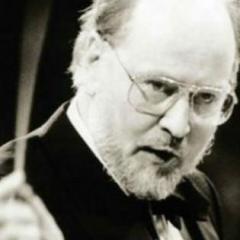
.thumb.png.99648892217b423e18fe027415380d39.png)
20thAnniversaryEdition.thumb.jpg.8f332140a7f08dd3051d720e581d69e5.jpg)

